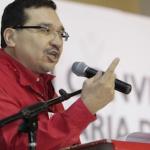US Threatens to Cut Aid to El Salvador for Backing Venezuela

The United States is threatening the small Central American country of El Salvador with financial repercussions for having supported Venezuela's campaign seeking the repeal of sanctions against the country.
The leftist Farabundo Marti National Liberation Front (FMLN) Front government of Salvador Sanchez Ceren, together with all of the countries of Latin America and the Caribbean, called on U.S. President Obama to repeal the executive order that declared Venezuela to be a “threat” to its national security.
However, the threat against El Salvador appears to be the first case of the U.S. trying to push its diplomatic weight around in order to force a sovereign country to take steps that would better align with U.S. interests.
“The government of the United States and the embassy are working hard to obtain money for the Alliance for Prosperity program (but) the reality is these messages make the work harder,” said Mari Carmen Aponte, the U.S. ambassador to El Salvador. The Alliance for Prosperity program is an effort by the U.S., together with Central American countries, to reduce the influx of migrants to the United States and the Obama Administration proposed US$1 billion in aid to the region as part of the initiative.
Medardo Gonzalez, secretary general of the ruling FMLN, criticized the statements made by the U.S. ambassador Monday. “We have the right to back Venezuela. We have expressed our solidarity and we maintain that the decree should be repealed,” said Gonzalez. The FMLN handed the U.S. ambassador approximately 25,000 signatures of Salvadorans calling for the United States to repeal the executive order ahead of the Summit of the Americas held earlier this month.
A U.S. official previously expressed disappointment over the lack of support in the region for U.S. sanctions against Venezuela. Even governments widely seen as close to the United States, such as Mexico and Colombia, who joined in the unanimous call for the executive order to be repealed. The statements by the U.S. ambassador may be an indication that the U.S. Department of State is now pursuing more forceful measures to win support for its highly unpopular decision to impose sanctions on Venezuela.
